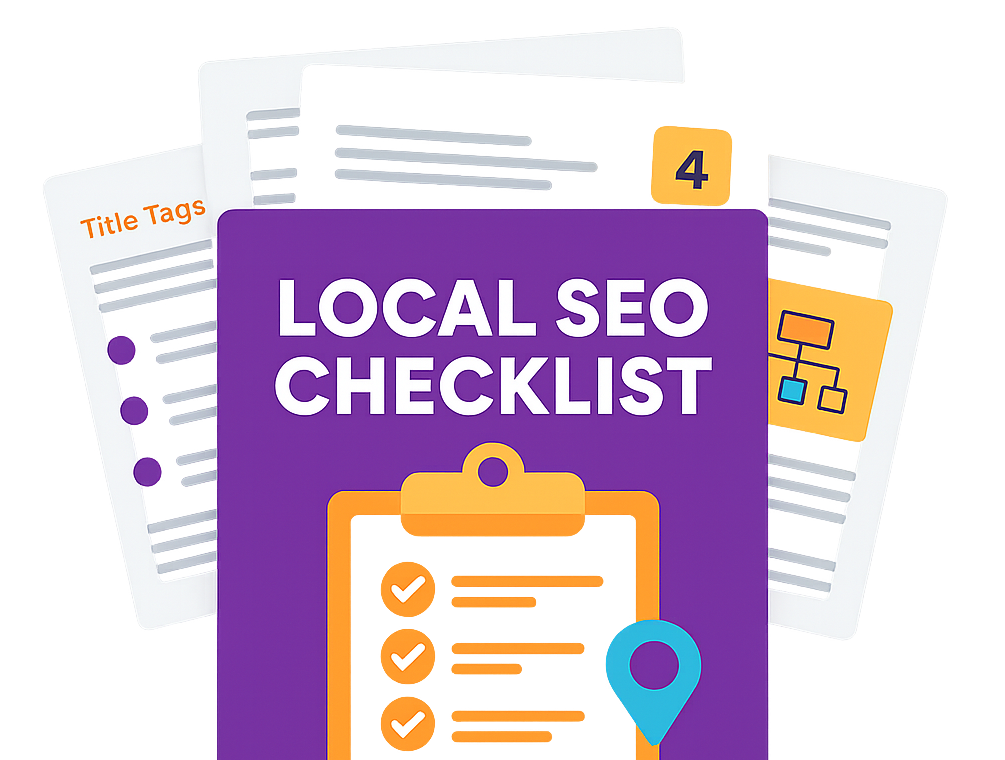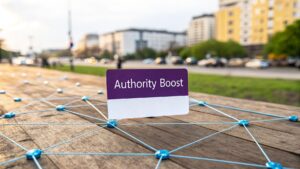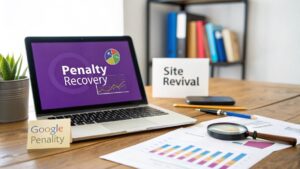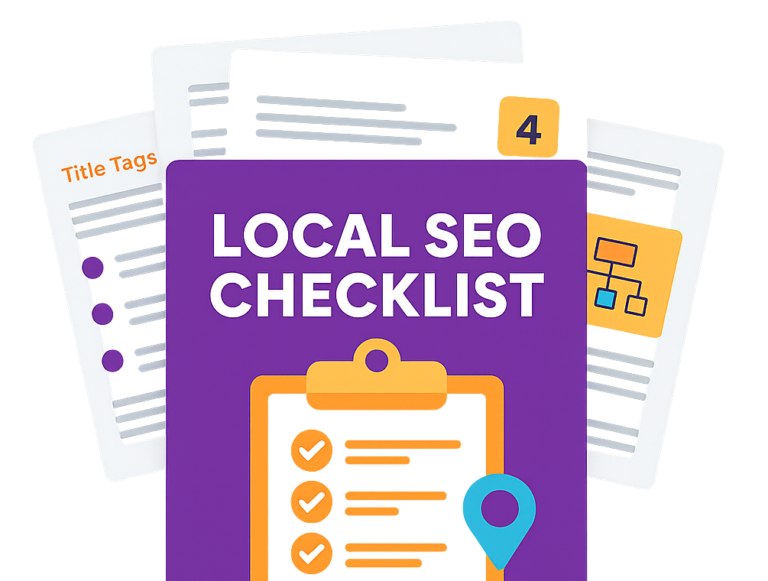Local SEO services aren't just another marketing expense for your small business; they're the bedrock of how you connect with customers right in your neighbourhood. Think of it as setting up shop on the busiest digital high street, making sure you’re the first business people see the moment they need what you offer.
Why Local SEO Is a Game-Changer for UK Businesses
Picture a potential customer walking through town. When they suddenly need a plumber, fancy a coffee, or are looking for a new hairdresser, they don't wander around hoping for the best. They pull out their phone. In that split second, your business either pops up on their screen, or for all intents and purposes, it doesn't exist. That's the new reality for small businesses all across the UK.
To really get a feel for the benefits, you first need to understand what is local SEO marketing and how it feeds directly into your bottom line. It’s all about making your business impossible to miss in local searches, ensuring you show up when someone searches for services "near me" or in a specific city.
The Modern Customer Journey Kicks Off Online
The way customers find local businesses has completely transformed. The days of thumbing through a hefty Yellow Pages are a distant memory. Today, the search starts and, more often than not, ends on Google. For small businesses, this is a huge opportunity to go toe-to-toe with bigger brands on a surprisingly level playing field.
The numbers don't lie. In the UK, a staggering 98% of consumers now turn to online searches to find local shops and services. Better yet, when these searches happen on a smartphone, around 76% of people will visit a business within 24 hours, and a solid 28% of those visits lead to a sale.
Local SEO isn't about being found by everyone, everywhere. It's about being found by the right people, in the right place, at the exact time they are ready to buy.
This laser-focused approach brings highly qualified leads straight to your door. It connects you with people who aren't just casually browsing; they have a real, immediate need and are actively hunting for a solution in your area. An investment in local search is a direct investment in your growth.
Before we dive into the nitty-gritty of how to get all this working for you, let's break down the core components of a winning local SEO strategy.
The Core Components of a Local SEO Strategy
Think of these elements as the essential ingredients for your local marketing success. Each one plays a distinct but interconnected role in boosting your visibility and attracting customers.
| Component | Primary Goal | Key Action |
|---|---|---|
| Local SEO Audit | To identify strengths, weaknesses, and opportunities. | Analyse your current online presence and competitor performance. |
| On-Page SEO | To make your website relevant to local search terms. | Optimise content, meta tags, and schema for your location. |
| Google Business Profile | To dominate the Google Map Pack and local results. | Fully complete your profile, add photos, and gather reviews. |
| Local Citations | To build trust and authority with search engines. | Ensure your business details (NAP) are consistent across online directories. |
| Review Management | To build social proof and improve customer trust. | Encourage and respond to customer reviews on all platforms. |
| Local Link Building | To signal local relevance and authority to Google. | Earn links from other local businesses, blogs, and community sites. |
Getting these pieces right is what separates the businesses that thrive from those that get lost in the noise. Now, let's explore each one in more detail.
Optimising Your Google Business Profile
Think of your Google Business Profile (GBP) as the cover of your business's book. It's often the very first thing a potential customer sees. It’s your digital shopfront, right there in Google search results and on Maps. A half-finished or neglected profile is like a shop with a faded sign and grubby windows—it just doesn't invite anyone in.
A fully optimised GBP is one of the most powerful free tools you have for local SEO. It's so much more than a simple listing; it's an interactive space where people can find your address, read reviews, look at photos, and even ask you questions directly. Critically, Google uses this information to decide how relevant you are and where you rank in the coveted "Local Pack"—that block of three businesses shown at the top of local search results.
This screenshot from Google’s own help centre shows you all the key areas where you can add and manage your business info, from services and photos to posts and Q&As.
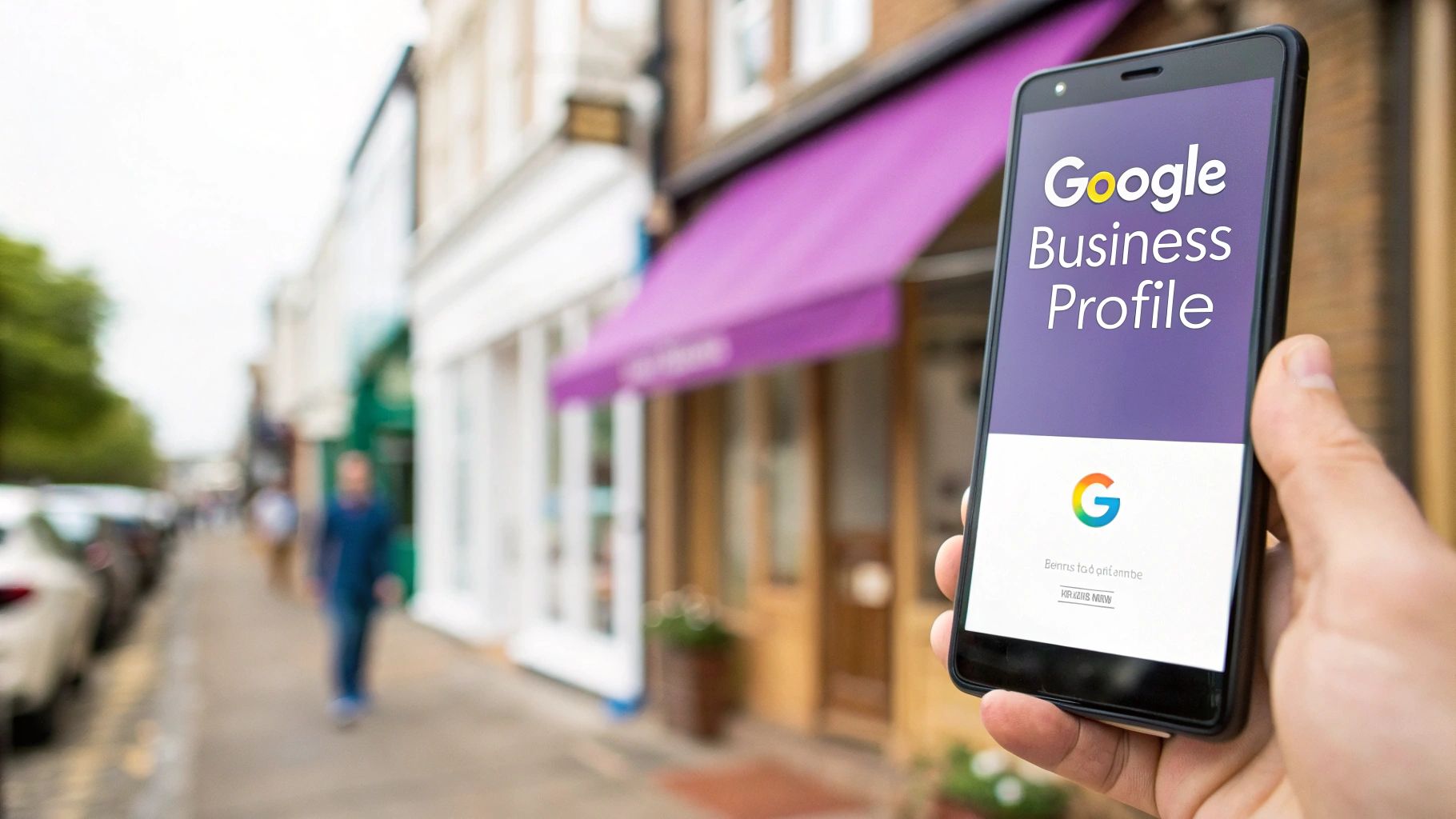
It’s clear that Google gives you a rich set of tools to present your business accurately and attractively. How you use them directly impacts how customers find, perceive, and connect with you.
Making Your Profile Work Harder
Just claiming your profile is step one. The real magic happens when you treat it like a dynamic, living marketing tool. This means going way beyond just listing your address and phone number. It requires a proactive approach to show off what makes your business special.
A proper Google Business Profile optimisation strategy is absolutely essential. It’s all about making sure every single section is filled out accurately and, just as importantly, persuasively.
Your business description isn't just a summary; it's your sales pitch. Use it to highlight what you do best and weave in keywords that local customers are actually searching for, like "emergency plumber in Cambridge" or "artisan bakery near Ely."
Next, get your business categories right. This is crucial. Choosing the right primary and secondary categories tells Google exactly what you do, helping it match you to the right searches. For example, a café should obviously pick "Café" as its primary category, but it could also add "Coffee Shop," "Sandwich Shop," and "Breakfast Restaurant" to cast a wider net and show up for more relevant queries.
Advanced Features That Drive Engagement
To truly pull ahead of the competition, you need to use the advanced features that many of your rivals completely ignore. These are the tools that turn your static profile into an active platform for winning new customers.
- Google Posts: Use this feature to shout about promotions, announce new products, or highlight special events. Posts are temporary, but they're a brilliant way to create a sense of urgency and show Google your profile is fresh and active.
- Q&A Section: Don't wait for people to ask questions—get in there first. Proactively add and answer the common questions your customers have. This not only gives people valuable information upfront but also lets you control the narrative and tackle potential concerns before they become roadblocks.
- Photos and Videos: We all know a picture is worth a thousand words. Regularly upload high-quality images of your premises, your team in action, and your finished work. It builds immense trust and gives potential customers a genuine feel for your business before they even get in touch.
Sending the Right On-Page Local Signals
Once your Google Business Profile is dialled in, it’s time to make sure your actual website is shouting the right things to search engines. Think of your website as your digital headquarters. If it doesn't clearly signal your local focus, Google will struggle to understand who you're trying to serve. Any good local SEO services for small business will drill down into these on-page details.
It all starts with the basics: your Name, Address, and Phone number (NAP). You need this information displayed clearly and consistently across your site. The best place for it? The footer of every single page. This makes it instantly visible to visitors and, more importantly, to the search engine bots crawling your site. Consistency is everything here—it’s a massive trust signal for Google.
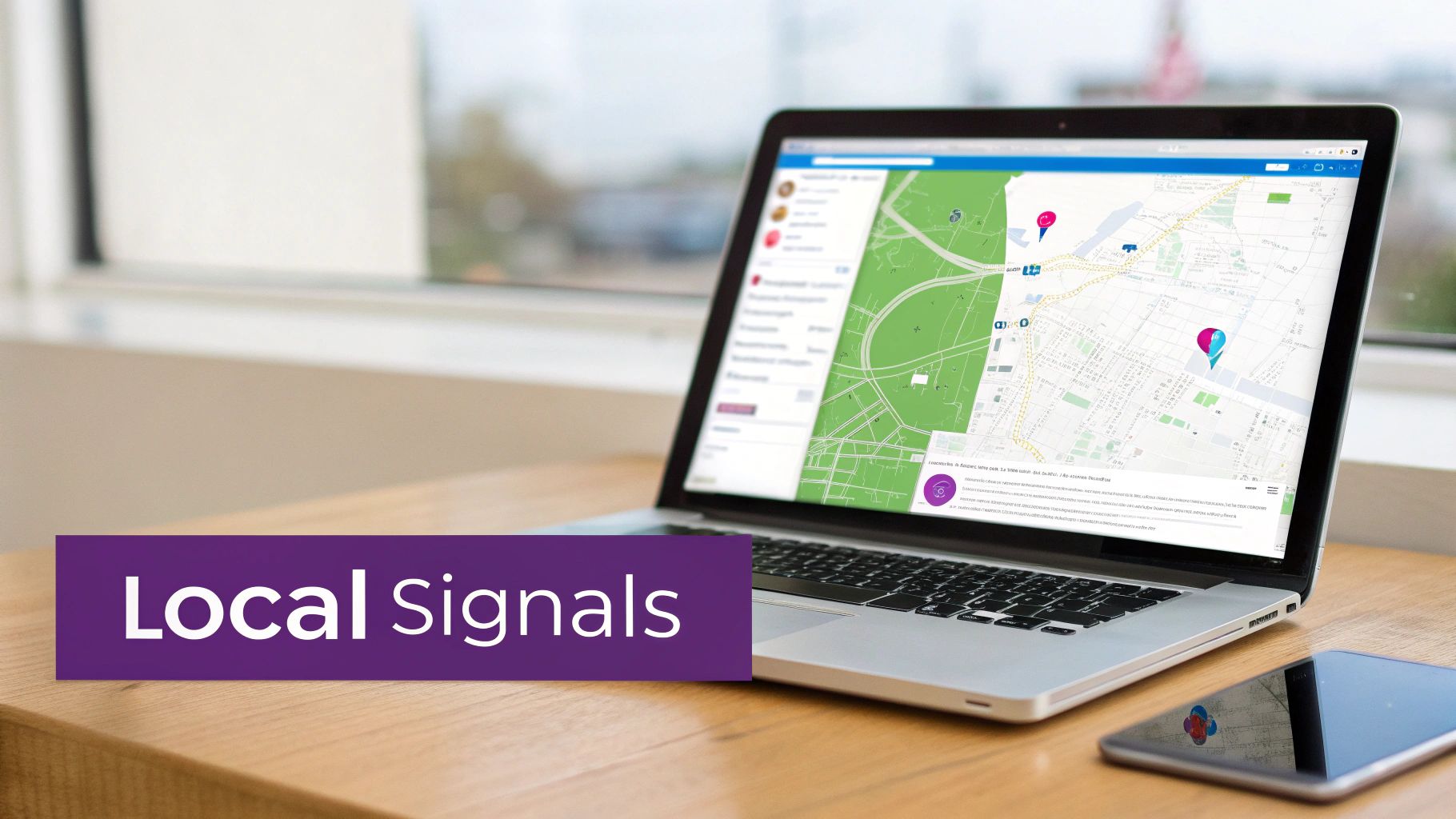
Creating Location-Specific Content
Just plastering your address everywhere isn't enough to really move the needle. The businesses that win at local search create content specifically for the communities they serve. This means building out dedicated pages that speak directly to local customers. For a deeper dive, our guide on on-page SEO best practices is a great place to start.
So, instead of one generic 'Services' page, you get specific. Think pages like:
- 'Emergency Plumber in Manchester'
- 'Artisan Coffee Shop in the Northern Quarter'
- 'Family Law Solicitor Serving Stockport'
These pages should be packed with content that resonates locally. Mention nearby landmarks, talk about issues specific to that neighbourhood, or highlight your involvement in the community. This tells Google you aren't just in a place; you're part of it.
A simple but incredibly powerful trick is to embed an interactive Google Map on your contact or location pages. It gives users a visual confirmation of where you are and gives search engines a machine-readable signal that backs up your address.
Becoming a Local Authority
Another smart move is using your blog to cement your status as a local expert. Write about local news, sponsor a youth football team, or talk about your participation in a community festival. Every post creates fresh, locally relevant content for your site.
This kind of activity signals to Google that your business is an active, authoritative voice in your area, which can give your local search rankings a serious boost. It shows a genuine connection that both algorithms and actual customers will appreciate.
Building Trust Through Local Citations
Think of local citations as digital signposts scattered across the web. Each one points back to your business, confirming to Google that you are who you say you are, and you're located where you claim to be.
At its core, a citation is any online mention of your business's Name, Address, and Phone number (NAP). You'll find them on online directories, social media profiles, and industry-specific websites. Every single one acts as a third-party vote of confidence, telling search engines your business is a legitimate, local operation.
The more consistent these signposts are, the more trust Google places in your business information. This trust is a massive factor in local search rankings. On the flip side, inconsistencies create confusion. Even something as tiny as using "St." on one directory and "Street" on another can muddy the waters and weaken your local SEO efforts.
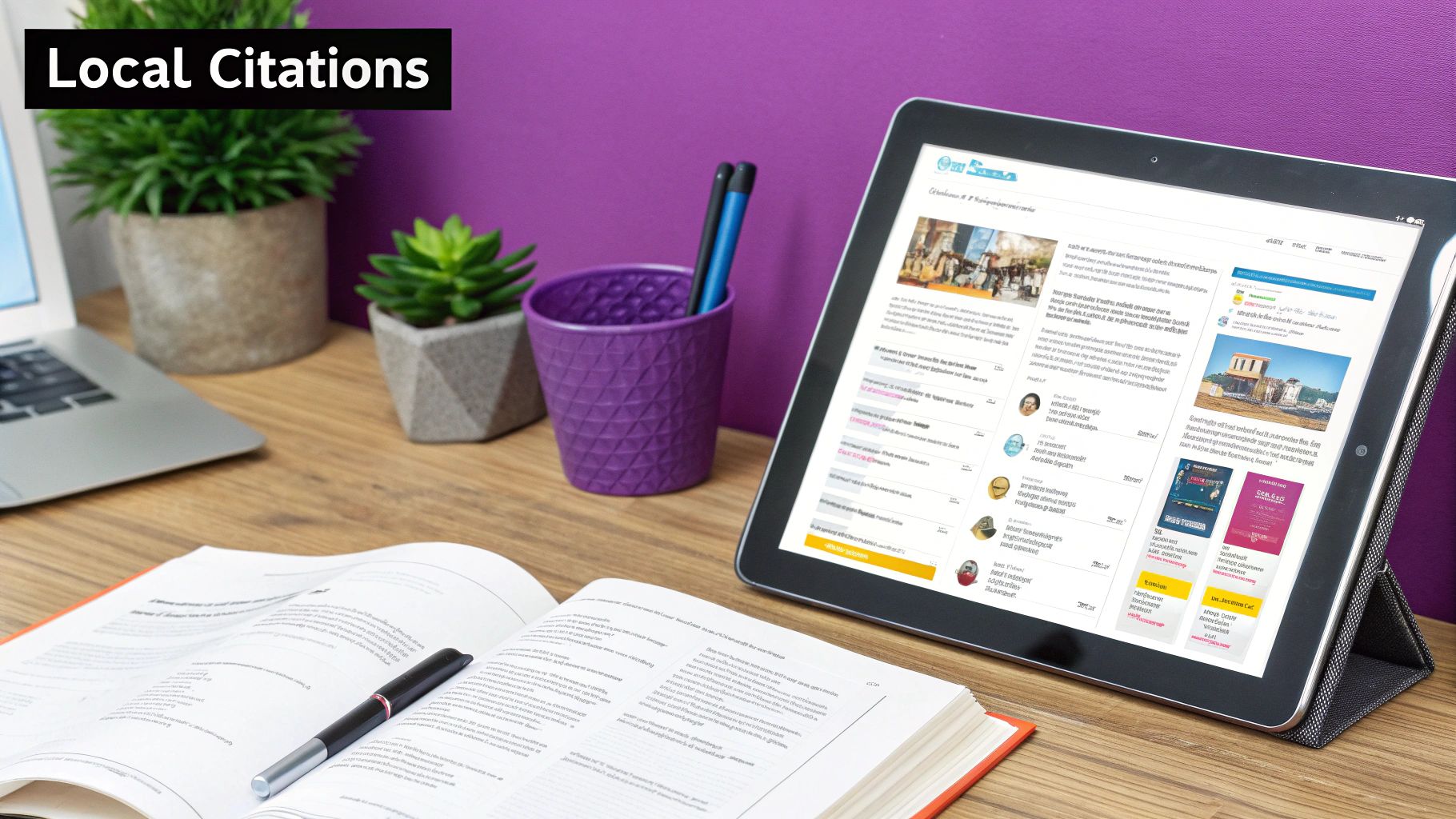
Why NAP Consistency Is Non-Negotiable
Keeping your NAP details identical everywhere is the golden rule of building citations. Search engines are constantly cross-referencing this information from dozens, sometimes hundreds, of sources to build a clear picture of your business. When every detail matches perfectly, it sends a powerful signal of reliability.
Think of it this way: if ten different people give someone directions to your shop, but they all offer slightly different street names or postcodes, the person will probably get confused and lose faith in the directions. Google works the same way, rewarding businesses that provide a clear, unwavering signal.
This is where specialised local SEO services in the UK really shine. Unlike broader SEO, they zero in on getting a business seen for local searches like 'near me' or 'best café in Bristol.' A huge part of this involves hunting down and fixing problems like inconsistent NAP data and managing your reputation across the web.
Auditing and Building Your Citation Profile
Before you even think about creating new listings, you need to conduct a citation audit. This means digging through the web to find every existing mention of your business. The goal is to spot any inconsistencies and correct them. It’s a bit of digital housekeeping, but it's absolutely essential for cleaning up your online footprint.
Once your existing listings are all singing from the same hymn sheet, it's time to build new ones. You want to get your perfectly consistent NAP details listed on high-quality, relevant directories that are trusted by both local customers and search engines in the UK.
Here’s where to focus:
- Key UK Directories: Make sure you have an accurate, complete listing on the big players like Yell, Thomson Local, and Scoot.
- Industry-Specific Sites: Find directories relevant to your trade. If you're a plumber, think Checkatrade. If you run a restaurant, think TripAdvisor.
- Hyperlocal Platforms: Look for local council directories or community websites that list businesses in your specific town or county.
Building a solid citation profile is a detailed, painstaking job, but it’s one of the cornerstones of great local SEO. To get a better handle on the nuts and bolts, check out our guide on the benefits of local directory submissions.
Managing Your Reputation with Online Reviews
Online reviews are the new word-of-mouth. Think about it—for most potential customers, checking out your reviews is the final hurdle before they decide to call you or pop into your shop. They're a direct ranking factor for Google and the ultimate social proof that tells people you’re the real deal.
Simply crossing your fingers and hoping for good reviews just isn't a strategy. You need to be on the front foot, actively encouraging your happy customers to share their experiences on key platforms like Google. This creates a constant flow of fresh, positive feedback that signals to search engines that your business is active, respected, and trustworthy.
The Art of Responding to Every Review
How you handle feedback—the good, the bad, and the ugly—says a lot about your business. When you respond to every review, it shows you actually care about your customers and their experience. A quick "thank you" for a positive review can go a long way in building loyalty.
But here’s the real opportunity: a thoughtful, professional reply to a negative review can be marketing gold. It shows everyone watching that you take concerns seriously and are committed to putting things right. That level of transparency often wins over a hesitant customer more effectively than a page full of five-star ratings ever could.
A negative review isn’t a disaster; it’s a public stage to show off your commitment to customer satisfaction. Facing criticism head-on shows confidence and can turn a bad experience into a testament to your professionalism.
A Practical Strategy for Review Management
Getting a grip on your online reputation requires a clear, repeatable process. It's a non-negotiable part of any solid plan for online reputation management and SEO, turning customer feedback from a potential liability into one of your greatest assets.
Here are a few actionable steps to build a powerful review profile:
- Make It Dead Simple to Leave a Review: Don't make people jump through hoops. Pop a direct link to your Google review page in your email signature, on your website, and in any follow-up messages after a purchase.
- Time Your Request Perfectly: The best time to ask is when the positive experience is still fresh. This could be right after you’ve finished a project or following a great chat in-store.
- Respond Promptly and Professionally: Try to reply to all new reviews within 24-48 hours. Keep it calm and professional, thank the reviewer by name if you can, and touch on any specific points they brought up.
- Share Your Best Feedback: Got a glowing review? Shout about it! Share it on your social media channels or create a testimonials section on your website. Put that hard-earned social proof to work.
If you're looking for tools to help streamline the process, platforms like goodkudos can help you request and monitor customer reviews across different sites, making the whole job a lot easier to manage.
A Practical Local SEO Checklist for Your Business
Alright, we've covered a lot of ground. Now it's time to roll up our sleeves and turn all that theory into action. This is where the rubber meets the road.
Think of this section as a straightforward checklist—your go-to guide for either auditing your current setup or kicking off a brand-new local SEO campaign from scratch. It's all about clear, actionable tasks you can start on today, organised around the core pillars of local search.
Your Google Business Profile Health Check
Your Google Business Profile is your digital shopfront. It's often the first impression a local customer has of your business, so keeping it in pristine condition is non-negotiable. A complete, active, and well-managed profile sends some of the strongest positive signals to Google.
Here's what to look for:
- Complete Every Section: Have you genuinely filled out everything? We’re talking services, accessibility options, business attributes, and all those little details.
- Use High-Quality Photos: Ditch the blurry phone snaps. Have you uploaded recent, high-resolution images of your premises, your team, and your work in action?
- Post Regularly: Are you using Google Posts at least once a week? This is your space to shout about offers, share news, or post updates to show you're active.
- Answer Q&As Proactively: Don't wait for customers to ask. Have you seeded the Q&A section with your own frequently asked questions and provided clear, helpful answers?
On-Page and Citation Consistency
Your website and your online listings need to sing from the same hymn sheet. Consistency is the bedrock of building trust, not just with customers, but with search engines too.
Every citation is a vote of confidence for your business. When they all match, the message is clear and powerful. When they don't, it creates confusion that can harm your rankings.
The infographic below breaks down the simple but essential cycle of managing your online reputation.
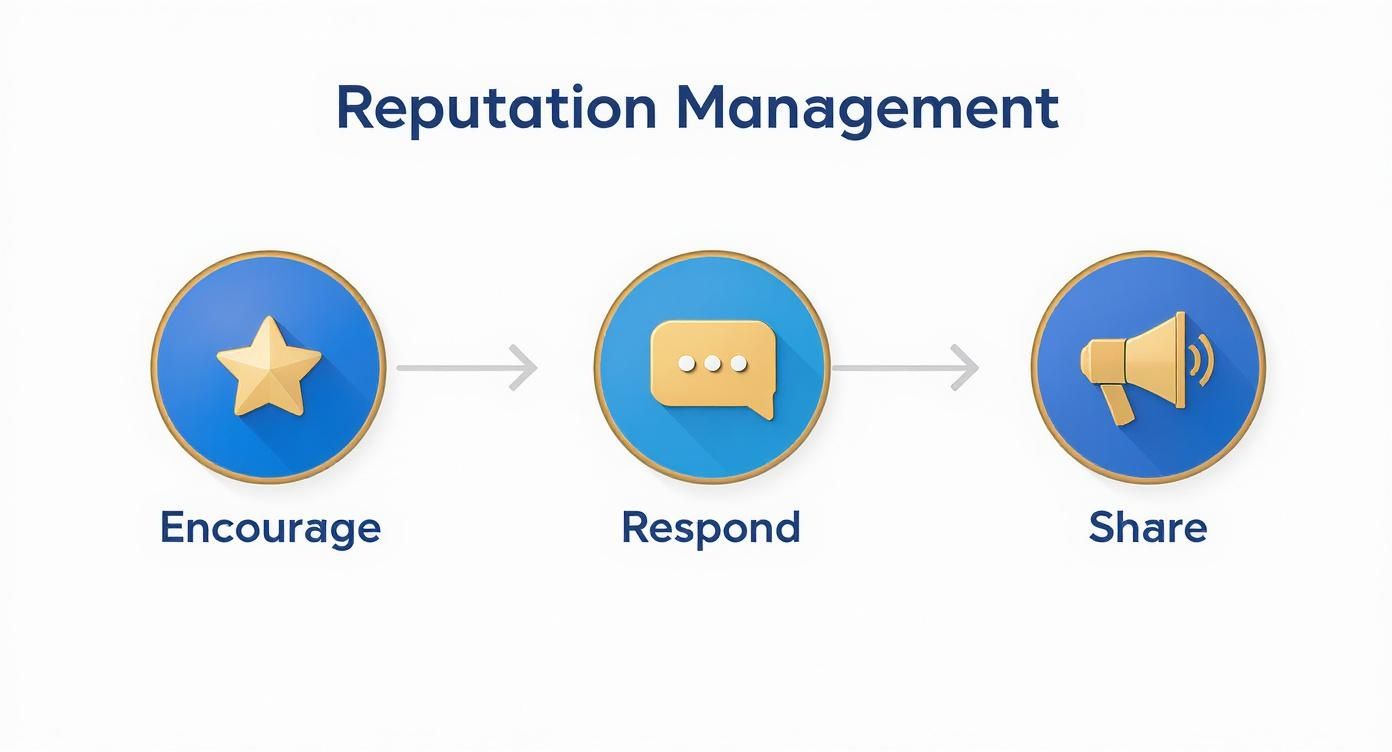
This process shows that managing your reputation isn't something you can set and forget—it's an active, ongoing cycle.
Reputation and Review Management
Your reviews are a direct reflection of your customer service, and they're a massive local ranking factor. You can't afford to ignore them.
- Check NAP Consistency: Is your Name, Address, and Phone number (NAP) 100% identical across your website and top UK directories like Yell? Even a small difference like "Ltd" vs "Limited" can cause problems.
- Monitor New Reviews: Do you have a solid process for checking new reviews daily on Google and other key platforms?
- Respond to All Feedback: Are you replying to both positive and negative reviews, ideally within 48 hours? A quick, professional response shows you care.
Working through this checklist regularly is the secret sauce. It’s how you make steady, meaningful improvements to your local visibility and start bringing more local customers through your door.
Monthly Local SEO Action Plan
To keep the momentum going, it's helpful to have a recurring to-do list. Local SEO isn't a one-and-done task; it's a marathon, not a sprint. This table breaks down key tasks into a manageable weekly and monthly schedule.
| Task Category | Weekly Action | Monthly Action |
|---|---|---|
| GBP Management | Publish 1-2 Google Posts. Upload 3-5 new photos. | Add 1 new Q&A. Review and update business info. |
| Review & Reputation | Check for and respond to all new reviews. | Analyse review sentiment and identify service improvements. |
| On-Page SEO | Review website analytics for top local landing pages. | Write and publish 1 new piece of local content (e.g., a blog post, case study). |
| Citation Health | – | Run a citation audit to find and fix inconsistencies. |
| Link Building | Identify 1 potential local link opportunity. | Conduct outreach for 1-2 high-quality local links. |
By breaking down your efforts into these small, consistent actions, you'll build a powerful local presence over time that your competitors will struggle to match.
Frequently Asked Questions
When you're trying to get to grips with local search, it's natural for questions to pop up. Let's tackle some of the most common ones we hear from small business owners about local SEO services. My goal here is to give you clear, straightforward answers to help you decide on your next steps.
How Long Does Local SEO Take To Show Results?
I get this question all the time, and the honest answer is: it’s not an overnight fix. While some quick wins, like a proper Google Business Profile tune-up, can start bringing in calls within a few weeks, a solid local SEO strategy is a long game.
You should realistically expect to see a real, noticeable shift in your local rankings and customer enquiries within 3 to 6 months. Think of it like building a reputation in your town – it doesn’t happen in a day. You need to be consistent. Building up your local authority, earning reviews, and fixing your business listings all take time. It's an ongoing effort that builds momentum, not a one-and-done task.
Can I Do Local SEO Myself?
Absolutely. It’s definitely possible for a business owner to handle their own local SEO, especially the basics like keeping your Google Business Profile fresh and engaging with reviews. But, and this is a big but, doing it effectively can be a massive time sink.
This is where an agency comes in. We bring specialist know-how, professional tools that cost a fortune, and most importantly, dedicated time to the table. An expert can run deep-dive audits, manage complex citation clean-up campaigns, and spot opportunities you might miss. The decision really boils down to what you have more of: time or budget. It also depends on how comfortable you are with the technical side of things.
What Is the Difference Between SEO and Local SEO?
The crucial difference is all about geography. Think of traditional SEO as casting a wide net to catch customers from all over the country, or even the world. It targets broad keywords to boost a website's visibility on a national scale.
Local SEO, on the other hand, is like being the most well-known, trusted expert on your specific street. It's laser-focused on getting your business in front of customers in your immediate area.
It’s all about winning those "near me" or "[your service] in [your town]" searches. Local SEO uses completely different signals to prove you're relevant to a specific community – things like your Google Business Profile, local business listings, and customer reviews are king here.
And it’s not just a nice-to-have. The data is clear: research shows that four out of five local searches on a mobile phone lead to a purchase, often within a few hours. You can dig into more stats on the power of local search for UK businesses on seoprofy.com.
Ready to make your business the go-to choice in your local area? Bare Digital offers specialised local SEO services designed for Cambridgeshire businesses. Get a free, no-obligation SEO Health Check and a clear, tailored proposal within 24 hours. Start attracting more local customers by visiting us at https://www.bare-digital.com.


